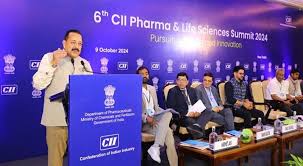
New Delhi: The Union Minister Dr Jitendra Singh said that the “Make in India” initiative was playing a pivotal role in reducing our dependency on imported Active Pharmaceutical Ingredients (APIs) and by strengthening our domestic manufacturing, we are not only bolstering self-reliance but also ensuring critical healthcare supplies are readily available. He was speaking at the 6th CII Pharma & Life Sciences Summit: 2024 here today. The Minister said, “This forum is a vital platform for the exchange of ideas among industry leaders, government officials, and academia, and exemplifies India’s determination to lead in the global pharmaceutical and biotech arenas.” Appreciating the pharma industry, he said, “India’s emergence as a hub for affordable, high-quality medicines is truly commendable. We now rank 3rd in pharmaceutical production by volume and 14th by value.” One of the most remarkable shifts within the industry has been the transition from a generic-focused model to the development of biopharmaceuticals and biosimilars, he added.
Speaking about next industrial revolution, the Minister said, it will come in biotech sector. Thanks to initiatives like the PLI scheme, India is well on its way to becoming a global leader in biopharmaceuticals, bio-manufacturing, and life sciences by 2030. However, there is still much to be achieved. I congratulate CII and the life sciences industry on your success, but we must not lose sight of the immense opportunities ahead, he added. Every third tablet consumed globally is made in India. A recent Central Drugs Standard Control Organization (CDSCO) survey across 48,000 drug samples from all Indian states revealed a spurious drug incidence of just 0.0245%. However, as goods travel across diverse climatic regions, improving the infrastructure and efficiency of transporting pharmaceutical products is vital to ensuring their efficacy. India’s leadership in global health is exemplified by the development of the world’s first DNA vaccine for COVID-19 and the efforts to develop the first Human Papilloma Virus (HPV) vaccine for adolescent girls, which will prevent cervical cancer. Furthermore, producing 65% of the world’s vaccines, India has significantly transformed health outcomes, especially for low- and middle-income countries. India’s bioeconomy has expanded 13-fold in just ten years, thanks to the thriving ecosystem of nearly 6,000 bio-startups. To sustain this momentum, industry must continue to invest in R&D, support young entrepreneurs, and foster a robust startup ecosystem. The Anusandhan National Research Foundation (ANRF), with a budget of Rs 50,000 crore over five years, marks a transformative step in building a knowledge-driven society.